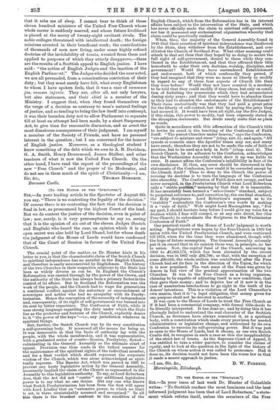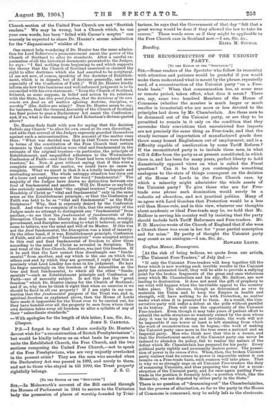SIR.—In your issue of last week Dr. Hunter of Galashiels
writes : "To Scottish readers the most luminous and the best informed judgment has been that of Lord Robertson," a state- , ment -which refutes itself, unless the members of the Free
Church section of the United Free Church are not "Scottish readers." We may be wrong, but a Church which, to use your own words, has been "felled with Caesar's sceptre" can scarcely be expected to share Dr. Hunter's serene admiration for the "dispassionate" wielder of it.
One cannot help wondering if Dr. Hunter has the same admira- tion for Lord Robertson's pronouncement anent the power of the Church of Scotland to alter its standards. After a careful ex- amination of all the historical documents presented to the Judges, he says : "I find nothing from beginning to end which supports the theory that the Church of Scotland exercised or claimed the right to alter doctrines which she had asserted to be scriptural. (I am not now, of course, speaking of the doctrine of Establish- ment, which is in dispute, but of doctrine generally, and more especially of the Confession of Faith.)" Will Dr. Hunter kindly inform me how this luminous and well-informed judgment is to be reconciled with his own statement: "Even the Church of Scotland, fettered, as some suppose, in belief and action by its relations with the State, has this great freedom, that the decisions of its own, courts are final on, all matters affecting doctrine, discipline, or worship" (the italics are mine) ? Does Dr. Hunter mean to say, for instance, that the General Assembly of the Church of Scotland has final power to pass a Declaratory Act anent the Confession; and, if so, what is the meaning of Lord Robertson's dictum quoted above?
Dr. Hunter finds fault with you for saying that the decision forbids any Church "to alter its own creed at its own discretion," and adds that several of the Judges expressly guarded themselves against such a misconstruction. His account of the matter runs thus: "What was decided was that in 1843 Trusts were formed in terms of the constitution of the Free Church that certain elements in that constitution were vital and fundamental in the estimate of the original trustees—in particular, the principle of Establishment, and unqualified adherence to the Westminster Confession of Faith—and that the Trust had been violated by the trustees," &c. Now, it goes without saying that if this were a complete account of the matter, we could have no cause to complain. What we assert is that it is a totally inadequate and misleading account. The whole unhappy situation has risen out of a loose and ambiguous use of the word "fundamental." The majority of the Judges have drawn no distinction between one kind of fundamental and another. Will Dr. Hunter or anybody else seriously maintain that "the original trustees" regarded the Headship of Christ as "vital and fundamental" only in the same sense as the Establishment principle ; or that the Confession of Faith was held to be as "vital and fundamental" as the Holy Scriptures ? Why, that is expressly denied by the Confession itself. And what we complain of is this, that the majority of the Judges made no attempt to distinguish one "fundamental" from another,—to see that the fundamental of fundamentals of the Disruption Church was liberty to deal with doctrine, worship, government, and discipline according to what it believed, or might come to believe, was the mind and will of its Master. If this was not the final fundamental, the Disruption was a kind of insanity. On the other hand, if it was, Establishment principle, Confession of Faith, and all so-called "fundamentals" were accepted subject to this real and final fundamental of freedom to alter these according to the mind of Christ as revealed in Scripture. The real trust of the Free Church, therefore, was just this freedom. If it be said that the Law cannot thus disentangle one "funda- mental" from another, and say which is the one on which the others rest and by which they are governed, I reply that this is precisely what Lord Lindley has done in his judgment. He lays his finger unerringly on the freedom of the Assemblies as the true and final fundamental, to which all the other " funda- mentals "—such as Establishment principle and Confession of Faith—are of necessity subject. Is not this just the "great freedom" which Dr. Hunter claims for the Church of Scotland ; and if so, why does he think it right that when we exercise it we should be fined in all our property? If I am right in my con- tention that the fundamental purpose of the Trust was, and is, spiritual freedom as explained above, then the House of Lords have made it impossible for the Trust ever to be carried out, for they have handed over all the property to men from whom their own decision takes away all freedom to alter a syllable of any of their "subordinate standards."
—With apologies for the length of this letter, I am, Sir, &c.,
Glasgow. jORN S. CARROLL.
Bewdley.
forgot to say that I share cordially Dr. Hunter's devout wish for "a reconstruction of Scotch Presbyterianism" ; but would he kindly inform us on what basis he proposes to unite the Established Church, the Free Church, and the two sections composing the United Free Church,—not to speak of the Free Presbyterians, who are very unjustly overlooked in the present crisis ? They are the men who seceded when the Declaratory Act was passed in 1892, and surely to them, and not to those who stayed in till 1900, the Trust property rightfully belongs. J. S. C.



































 Previous page
Previous page